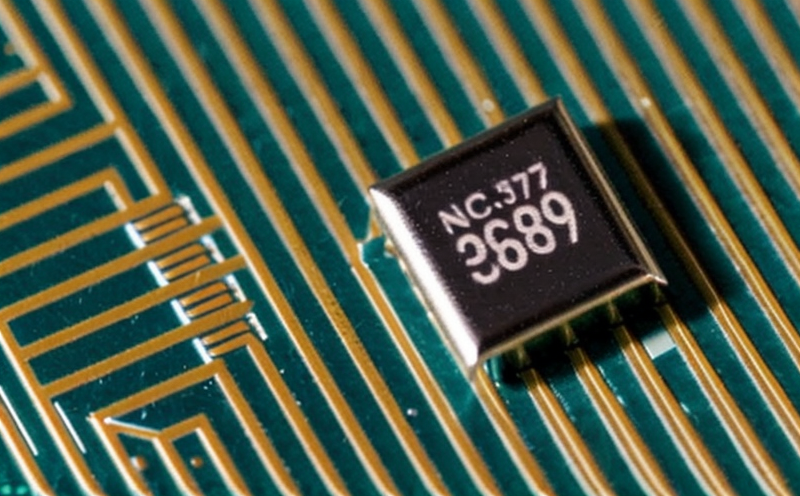IEC 60749-23 Electrical Performance Reliability Testing
The IEC (International Electrotechnical Commission) standard IEC 60749-23 addresses the electrical performance reliability testing of semiconductor and microchip devices. This standard is crucial for ensuring that semiconductor devices can withstand long-term operational conditions, thereby enhancing system reliability in various industrial applications.
The primary focus of IEC 60749-23 is to assess how well a device maintains its specified electrical characteristics under stress over time. The test parameters include voltage, current, temperature cycling, and other environmental factors that can degrade semiconductor performance over extended periods.
For quality managers, compliance officers, R&D engineers, and procurement specialists involved in the development of semiconductor devices, this testing is essential for ensuring product reliability and compliance with international standards. This service ensures not only the longevity but also the safety and efficiency of microchip products used in critical systems such as automotive electronics, telecommunications, and aerospace.
Compliance with IEC 60749-23 is increasingly important given the growing demand for reliable electronic components in high-reliability applications. This standard helps manufacturers to avoid costly recalls and reputational damage by ensuring that their products meet stringent reliability requirements before reaching the market.
The testing process involves subjecting microchips to controlled environments that simulate real-world conditions, including temperature extremes, voltage fluctuations, and other stressors. This ensures that the device remains operational within specified parameters throughout its expected lifespan.
Our laboratory uses advanced instrumentation and cutting-edge techniques to conduct these tests with precision and accuracy. The data collected during testing is meticulously analyzed, providing detailed insights into the electrical performance of the microchip under various conditions.
Why It Matters
The importance of IEC 60749-23 cannot be overstated in today's highly competitive global market. Ensuring that semiconductor devices meet stringent reliability standards is critical for several reasons:
- It enhances product safety, reducing the risk of failures and potential hazards.
- It improves customer satisfaction by delivering products that perform consistently over time.
- It supports brand reputation and trustworthiness among consumers.
- It minimizes warranty claims and associated costs for manufacturers.
In addition, compliance with this standard can also lead to regulatory approval in multiple countries, broadening market reach. This is particularly important for companies operating in the automotive, aerospace, and medical device industries where reliability is paramount.
Scope and Methodology
| Test Parameter | Description |
|---|---|
| Temperature Cycling | Involves subjecting the microchip to rapid temperature changes to simulate real-world conditions. |
| Voltage Stress | Evaluates how well the device handles high voltage levels without failure. |
| Current Load Testing | Determines the maximum current a device can handle before degradation. |
| Environmental Exposure | Includes tests for humidity, dust, and other environmental factors that may affect performance. |
The methodology involves several stages:
- Preparation: The microchips are prepared according to IEC 60749-23 specifications. This includes cleaning, mounting, and ensuring the device is free from contaminants.
- Temperature Cycling: The devices are subjected to a series of temperature cycles to simulate real-world conditions over time.
- Voltage Stress Testing: The microchips undergo voltage stress tests to evaluate their ability to handle high voltage levels without failure.
- Data Analysis: After the tests, data is collected and analyzed to determine compliance with IEC 60749-23 standards.
The results are reported in a comprehensive manner, providing detailed insights into the electrical performance of the microchips under various conditions. Compliance with these tests ensures that the devices meet stringent reliability requirements before they reach the market.
Industry Applications
| Industry | Applications |
|---|---|
| Automotive Electronics | Ensuring long-term reliability of microchips used in automotive systems. |
| Telecommunications | Maintaining performance and reliability of electronic components in communication networks. |
| Aerospace & Defense | Providing reliable semiconductor devices for critical applications in space missions and defense systems. |
| Medical Devices | Ensuring the safety and efficacy of microchips used in medical implants and monitoring systems. |
The IEC 60749-23 standard is widely applicable across various industries. The rigorous testing ensures that semiconductor devices can withstand harsh operational conditions, thereby enhancing system reliability in critical applications.
- Automotive Electronics: Ensures long-term reliability of microchips used in automotive systems.
- Telecommunications: Maintains performance and reliability of electronic components in communication networks.
- Aerospace & Defense: Provides reliable semiconductor devices for critical applications in space missions and defense systems.
- Medical Devices: Ensures the safety and efficacy of microchips used in medical implants and monitoring systems.
The standard is particularly important for industries where failure can lead to significant risks or costs. Compliance with IEC 60749-23 ensures that semiconductor devices meet stringent reliability requirements before they are deployed in these critical applications.





